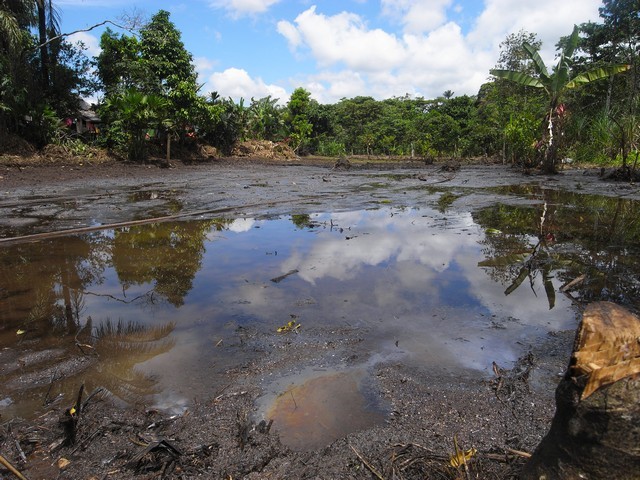By Robert Barsocchini
Telesur:
The International Court of Justice (CIJ) ruled Thursday a prior ruling by an Ecuadorean court that fined the U.S.-based oil company Chevron US $9.5 billion in 2011 should be upheld.
The money will benefit about 30,000 Ecuadorians, most of them indigenous.
Background from Amazon Watch:
In 1964, Texaco (now Chevron), discovered oil in the remote northern region of the Ecuadorian Amazon, known as the Oriente; the East. The indigenous inhabitants of this pristine rainforest, including the Cofán, Siona, Secoya, Kichwa and Huaorani tribes, lived traditional lifestyles largely untouched by modern civilization.
They had little idea what to expect or how to prepare when oil workers moved into their backyard and founded the town of Lago Agrio, or “Sour Lake”, named after the town in Texas where oil company Texaco was founded.
In a rainforest area roughly three times the size of Manhattan, Chevron carved out 350 oil wells, and upon leaving the country in 1992, left behind some1,000 open-air, unlined waste pits filled with crude and toxic sludge. Many of these pits leak into the water table or overflow in heavy rains, polluting rivers and streams that tens of thousands of people depend on for drinking, cooking, bathing and fishing. Chevron also dumped more than 18 billion gallons of toxic wastewater called “produced water” – a byproduct of the drilling process – into the rivers of the Oriente. At the height of Texaco’s operations, the company was dumping an estimated 4 million gallons per day, a practice outlawed in major US oil producing states like Louisiana, Texas, and California decades before the company began operations in Ecuador in 1967. By handling its toxic waste in Ecuador in ways that were illegal in its home country, Texaco saved an estimated $3 per barrel of oil produced.
A public health crisis of immense proportions grips the Ecuadorian Amazon, the root cause of which is massive contamination from 40 years of oil operations. Texaco [Chevron] dumped 18 billion gallons of toxic wastewater directly into the region’s rivers and streams depended upon for drinking, cooking, bathing and fishing. The contamination of water essential for the daily activities of tens of thousands of people has resulted in an epidemic of cancer, miscarriages, birth defects, and other ailments.
When Texaco arrived in Ecuador in 1964, the company found a pristine rainforest environment.
This story also has relevance to the US interest in exerting control over Venezuela, which has some of the world’s largest oil reserves.
Glenn Greenwald:
Venezuela is one of the very few countries with significant oil reserves which does not submit to U.S. dictates, and this simply cannot be permitted (such countries are always at the top of the U.S. government and media list of Countries To Be Demonized).
A study conducted by the Universities of Portsmouth, Warwick and Essex recently found:
…foreign intervention in a civil war is 100 times more likely when the afflicted country has high oil reserves than if it has none.
…hydrocarbons were a major reason for the [US/UK/FR/CA] military intervention in Libya … and the current US campaign against Isis in northern Iraq.
“Before the Isis forces approached the oil-rich Kurdish north of Iraq, Isis was barely mentioned in the news. But once Isis got near oil fields, the siege of Kobani in Syria became a headline and the US sent drones to strike Isis targets”
The major political science study on the topic, conducted out of Cornell and Northwestern universities,recently found, after studying nearly 2,000 policy issues (essentially any issue one can imagine), that the majority of the US population has statistically zero influence on US policy, while the wealthiest portions of society – ie owners of corporations such as Chevron – essentially dictate policy – a political system called “oligarchy”.
Robert Barsocchini is an internationally published researcher and writer who focuses on global force dynamics and also writes professionally for the film industry.
15 March, 2015
Countercurrents.org

